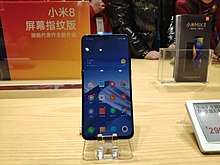 | |
 | |
| Manufacturer | Xiaomi |
|---|---|
| Type | Touchscreen smartphone |
| Series | Mi |
| First released | March 2019 (Mi 9) April 2019 (Mi 9 Explorer) |
| Predecessor | Xiaomi Mi 8 |
| Successor | Xiaomi Mi 10 |
| Related | Xiaomi Mi 9 Pro |
| Form factor | Slate |
| Dimensions |
|
| Weight | 173 g (6.1 oz) |
| Operating system | Original: MIUI 10 based on Android 9 Pie Current: MIUI 12.5 based on Android 11 |
| System-on-chip | Qualcomm Snapdragon 855 |
| CPU | Octa-core Kryo 485 (1x 2.84 GHz + 3x 2.42 GHz + 4x 1.8 GHz) |
| GPU | Adreno 640 |
| Memory | 6 GB or 8 GB LPDDR4X RAM 8 GB or 12 GB LPDDR4X RAM (Mi 9 Explorer) |
| Storage | 64 GB or 128 GB 256 GB (Mi 9 Explorer) |
| Removable storage | None |
| Battery | Non-removable Li-Po 3300 mAh battery |
| Rear camera | Triple: 48 MP Wide (f/1.5 (Mi 9 Explorer 12 GB RAM) or f/1.8, 27mm, 1/2", 0.8μm) + 16 MP Ultrawide (f/2.2, 13mm, 1/3", 1.0μm) + 12 MP Telephoto (f/2.2, 54mm, 1/3.6" 1.0μm), 2x optical zoom, laser/phase detection autofocus, dual-LED flash |
| Front camera | 20 MP (f/2.0, 0.9μm), 1080p |
| Display | 6.39 inches (162.3 mm), 1080 x 2340 pixels, (403 ppi), SUPER AMOLED touchscreen, 16M colors HDR10 DCI-P3 |
| Connectivity | 2G, 3G, 4G, 4G LTE, Wi-Fi 802.11a/b/g/n/ac (2.4 & 5GHz), dual-band, WiFi Direct, DLNA, hotspot |
| Data inputs | Dual band GNSS (GPS/GLONASS/BeiDou/Galileo) Bluetooth V5, A2DP, Low-energy, aptX HD |
| Codename | cepheus |
| Website | Mi 9 |
The Xiaomi Mi 9 is a flagship Android smartphone developed by Xiaomi Inc. It was announced in February 2019. [1]